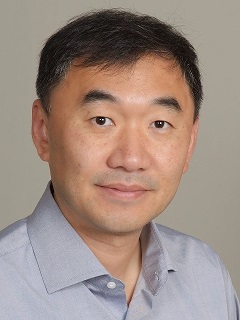SPS Lecture by Dr. Jie Liu on "Low-Energy and Flexible GPS Sensing Through Cloud Offloading"
This is sponsored by the University of Maryland Booz Allen Hamilton Distinguished Colloquium Series of the Electrical and Computer Engineering at University of Maryland, College Park, and co-sponsored by the IEEE Signal Processing Washington Chapter.
"Low-Energy and Flexible GPS Sensing Through Cloud Offloading"
Speaker: Dr. Jie Liu (Microsoft Research -- Redmond, WA)
Date and Time
Location
Hosts
Registration
-
 Add Event to Calendar
Add Event to Calendar
- University of Maryland - College Park
- 8228 Paint Branch Drive
- College Park, Maryland
- United States 20742
- Building: Kim Engineering Building
- Room Number: 1110
- Click here for Map
- Contact Event Host
-
Dr. Min Wu -- Professor of UMD ECE and SPS Washington Chapter Chair
minwu@umd.eduMs. Sandra Nicholes -- ECE External Relation Team, University of Maryland
office. 301.405.3114| fax. 301.314.9281 | snichol@ece.umd.edu | www.ece.umd.edu - Co-sponsored by UMD ECE Dept.
Speakers
 Dr. Jie Liu of Microsoft Research -- Redmond, WA, USA
Dr. Jie Liu of Microsoft Research -- Redmond, WA, USA
Low-Energy and Flexible GPS Sensing Through Cloud Offloading
Location-based services have become ubiquitous, thanks to sensors like GPS and RF receivers in our smart phones. However, the energy consumption of GPS receiving is a major bottleneck for long-term and frequent location sensing. In this talk, I will take a deep look into the GPS receiving pipeline and present our efforts on a cloud-offloading approach to GPS-based location sensing. The partitioning between device and cloud brings three kinds of benefits. First, we can reduce the device side energy consumption by orders of magnitude. Second, with the computation power in the cloud, we can achieve high sensitivity and make GPS receiver work in many indoor places. Finally, we can leverage opportunistic energy sources on the device side to reduce the amount of data to be transferred between device and cloud. The cloud-offloading architecture help push location sensing and tracking to the next tier of IoT devices.
Biography:
Dr. Jie Liu is a Principal Researcher at Microsoft Research-NExT, Redmond, WA, and Senior Director of the VESTA Group– its Venture in Embedded Sensing Technologies and Applications. His research interests root in computing systems and services that sense and interact with the physical world. Examples include time, location, and energy awareness, and Internet/Intelligence of Things. He has published broadly in areas such as sensor networking, embedded devices, mobile and ubiquitous computing, and data center management. He has received 5 Best Paper Awards in top academic conferences in these fields. In addition, he holds 100+ patents or pending patents. He is an Associate Editor of ACM Trans. on Sensor Networks, was an Associate Editor of IEEE Trans. on Mobile Computing, and has chaired several top-tier conferences in sensor network and cyber-physical systems. He received his Ph.D. degree from Electrical Engineering and Computer Sciences, UC Berkeley in 2001, and his Master and Bachelor degrees from Department of Automation, Tsinghua University, Beijing, China. From 2001 to 2004, he was a research scientist in Palo Alto Research Center (formerly Xerox PARC). He is an ACM Distinguished Scientist and a IEEE Senior Member.
[URL: https://www.microsoft.com/en-us/research/people/liuj/]
Email:
Dr. Jie Liu of Microsoft Research -- Redmond, WA, USA
Low-Energy and Flexible GPS Sensing Through Cloud Offloading
Biography:
Email:
Agenda
3:15 - 3:30pm: Checking in
3:30 - 4:30pm: Lecture by Dr. Jie Liu (Microsoft Research -- Redmond, WA)
4:30 - 5:00pm: Reception (with light refreshment)
"Low-Energy and Flexible GPS Sensing Through Cloud Offloading"
Location-based services have become ubiquitous, thanks to sensors like GPS and RF receivers in our smart phones. However, the energy consumption of GPS receiving is a major bottleneck for long-term and frequent location sensing. In this talk, I will take a deep look into the GPS receiving pipeline and present our efforts on a cloud-offloading approach to GPS-based location sensing. The partitioning between device and cloud brings three kinds of benefits. First, we can reduce the device side energy consumption by orders of magnitude. Second, with the computation power in the cloud, we can achieve high sensitivity and make GPS receiver work in many indoor places. Finally, we can leverage opportunistic energy sources on the device side to reduce the amount of data to be transferred between device and cloud. The cloud-offloading architecture help push location sensing and tracking to the next tier of IoT devices.

